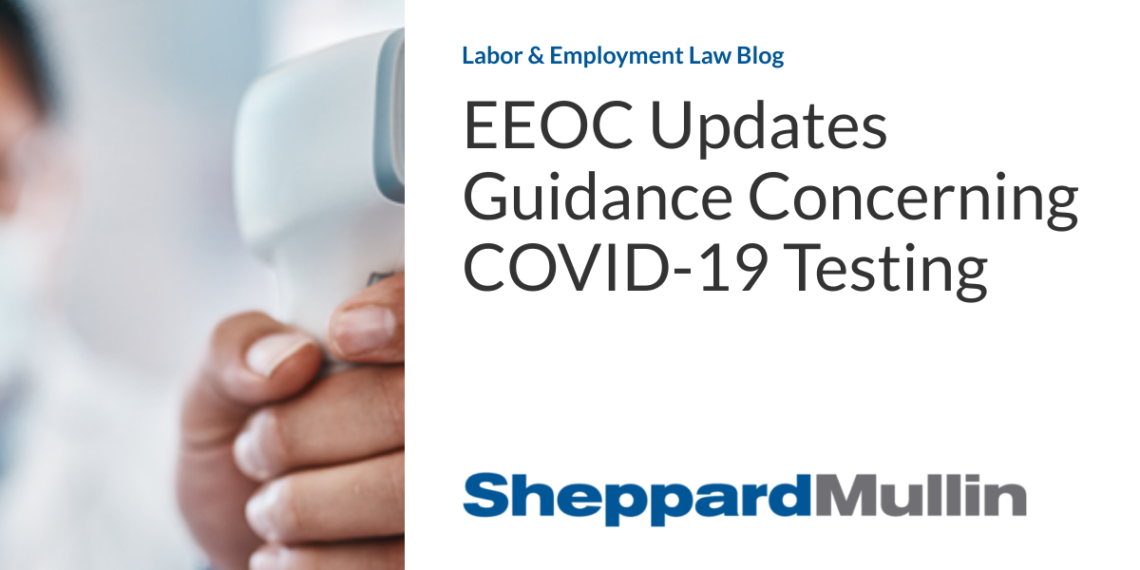[ad_1]
As more employees return to the workplace after the Labor Day holiday, employers should be aware of the U.S. Equal Opportunity Commission’s updated COVID-19 Guidance, “What You Should Know About COVID-19 and the ADA, the Rehabilitation Act, and other EEO Laws.” The updated guidance follows its Vaccination Policy Update and primarily addresses workplace safety questions, including when employees and applicants may be required to undergo viral and antibody testing and other types of screening.
Viral Testing
With respect to viral testing, the EEOC has adopted a more limited approach that requires employers to perform a business necessity analysis. The new guidance states that, going forward, employers must assess current pandemic circumstances and individual workplace circumstances to justify viral screening testing. This applies to both returning to and remaining at work. Additionally, testing must be “job-related and consistent with business necessity” i.e., necessary for the safety of the workplace considering the job in question.
In an effort to clarify the standard, the EEOC offers possible factors to consider in making the “business necessity” assessment, including:
- level of community transmission;
- the vaccination status of employees;
- the accuracy and speed of processing for different types of COVID-19 viral tests;
- the degree to which breakthrough infections are possible for employees who are “up to date” on vaccinations;
- the ease of transmissibility of the current variant(s), the possible severity of illness from the current variant;
- what types of contacts employees may have with others in the workplace or elsewhere that they are required to work (e.g., working with medically vulnerable individuals); and
- the potential impact on operations if an employee enters the workplace with COVID-19.
In adopting an individualized approach, the EEOC seeks to acknowledge that evolving pandemic circumstances will require an individualized assessment by employers to determine whether such testing is warranted.
The EEOC also advises that mandatory testing will meet the “business necessity” standard when done in accordance with guidance from the Centers for Disease Control and Protection, the Food and Drug Administration, and state or local health authorities. It adds that these bodies may update their guidance periodically, so employers should stay up to date to ensure compliance.
Antibody Testing
The Guidance also reiterates the EEOC’s position that antibody testing is prohibited. In support of this, the EEOC notes that as of July 2022, the CDC’s guidance indicates that antibody tests show neither whether the employee is infected nor whether the employee is immune from infection. The tests, therefore, do not meet the “business necessity” standard as they are not helpful to determine whether the employee’s presence will pose a risk to themselves or others.
Applicant Testing
With respect to applicants, employers may require screening (whether by viral test, temperature check, or otherwise) after making a conditional job offer, so long as others in the same position are also screened in the same manner. However, if an applicant is required to be on-site during the pre-offer stage, the employer can screen the applicant before issuing a conditional job offer so long as the employer screens everyone (i.e., applicants, employees, contractors, visitors) for COVID-19 prior to entry.
The legal landscape continues to evolve quickly and there is a lack of clear-cut authority or bright line rules on implementation. This article is not intended to be an unequivocal, one-size fits all guidance, but instead represents our interpretation of where applicable law currently and generally stands. This article does not address the potential impacts of the numerous other local, state and federal orders that have been issued in response to the COVID-19 pandemic, including, without limitation, potential liability should an employee become ill, requirements regarding family leave, sick pay and other issues.
[ad_2]




